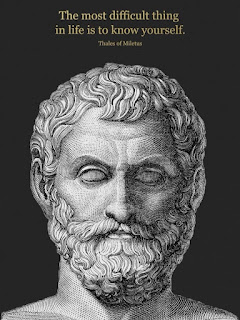Thales of Miletus, who lived around 624-546 BCE, is often regarded as one of the earliest Western philosophers and the first philosopher of ancient Greece. While historical details about Thales are scarce, his contributions to philosophy and scientific thought laid the groundwork for future developments in various fields.
Life of Thales:
Thales was born in the ancient Greek city of Miletus, located in what is now Turkey. He was involved in various fields, including mathematics, astronomy, and engineering. Thales traveled extensively, gaining knowledge from different cultures.
Philosophy of Thales:
1. Water as the Fundamental Substance:
- Thales is famously known for positing that water is the fundamental substance or arche (αρχή) underlying all things in the universe. He believed that everything could be traced back to water as the essential building block.
- This concept marked a shift from mythological explanations to a more abstract and naturalistic approach to understanding the world.
2. Predictions in Astronomy:
- Thales demonstrated a practical understanding of astronomy by reportedly predicting a solar eclipse in 585 BCE. While historical accuracy is challenging to verify, the anecdote underscores Thales' interest in celestial phenomena and his application of scientific reasoning.
Implementation in Life:
1. Practical Applications of Philosophy:
- Thales' philosophical ideas were not purely abstract but had practical applications. His emphasis on water as a fundamental substance might have influenced his approach to engineering, agriculture, and understanding the natural world around him.
- The idea that the world operates according to natural principles rather than capricious gods laid the foundation for a more systematic and scientific approach to problem-solving.
2. Ethical Implications:
- While Thales is not widely recognized for extensive ethical teachings, his emphasis on seeking natural explanations for phenomena and understanding the underlying unity of the world could be interpreted as encouraging a rational and harmonious approach to life.
- Thales' shift towards explaining natural phenomena without relying on mythological narratives contributed to a more reasoned understanding of the world, which could influence ethical perspectives.
3. Legacy in Scientific Inquiry:
- Thales' focus on identifying a single, fundamental substance inspired later philosophers to explore similar ideas. His emphasis on naturalistic explanations and the pursuit of knowledge for its own sake laid the groundwork for the scientific method.
In essence, Thales' philosophy marked a transition from mythological explanations to rational inquiry. His view that natural phenomena could be understood through fundamental principles paved the way for subsequent generations to engage in scientific and philosophical exploration. Thales' legacy resides not only in his specific ideas but also in his foundational role in shaping the trajectory of Western philosophical and scientific thought.
Thales of Miletus, often regarded as one of the first Western philosophers, is best known for his theory that water is the fundamental substance (arche) underlying all things in the universe. While Thales did not leave extensive written records, this concept holds significance in the history of philosophy and science.
Thales' Philosophy:
1. Water as the Fundamental Substance:
- Thales proposed that everything in the world, despite its apparent diversity, could be traced back to water as the essential substance. This idea marked a departure from mythological explanations for the natural world, introducing a more abstract and naturalistic approach to understanding reality.
- While the notion of water as the arche may seem simplistic by modern standards, Thales' bold move laid the groundwork for future philosophers to explore the fundamental building blocks of the cosmos.
2. Unity and Interconnectedness:
- Thales' philosophy suggested a fundamental unity and interconnectedness in the diversity of the world. By seeking a single substance as the origin of all things, he emphasized an underlying order and simplicity beneath the surface complexity of the observable world.
- This notion of unity would later become a recurring theme in the philosophical quest for understanding the ultimate nature of reality.
Implications and Legacy:
1. Scientific Inquiry and Rational Exploration:
- Thales' emphasis on identifying a fundamental substance reflects an early attempt to explain natural phenomena through reason rather than resorting to mythological narratives. This shift laid the foundation for a more systematic and scientific approach to understanding the world.
- Thales' legacy endures as a precursor to later philosophers and scientists who sought naturalistic explanations for the workings of the universe.
2. Philosophical Foundations:
- Thales' philosophy contributed to the broader shift from mythos to logos, moving away from relying solely on religious and mythological stories to explain the world. His inquiry into the fundamental substance set the stage for subsequent philosophical investigations into the nature of reality.
3. Critical Thinking and Open Inquiry:
- Thales' approach encourages critical thinking and open inquiry into the nature of existence. By challenging prevailing mythological explanations, he exemplified a willingness to question and seek rational understanding, which became a hallmark of later philosophical endeavors.
In essence, the best philosophy of Thales lies in his pioneering effort to identify a single, fundamental substance underlying the diversity of the world. While his specific choice of water as the arche might be debated, his emphasis on seeking naturalistic explanations and understanding the unity of the cosmos represents a foundational moment in the history of philosophy and scientific inquiry. Thales' legacy endures as a trailblazer who set the stage for the rich philosophical tradition that followed in ancient Greece and beyond.

No comments:
Post a Comment